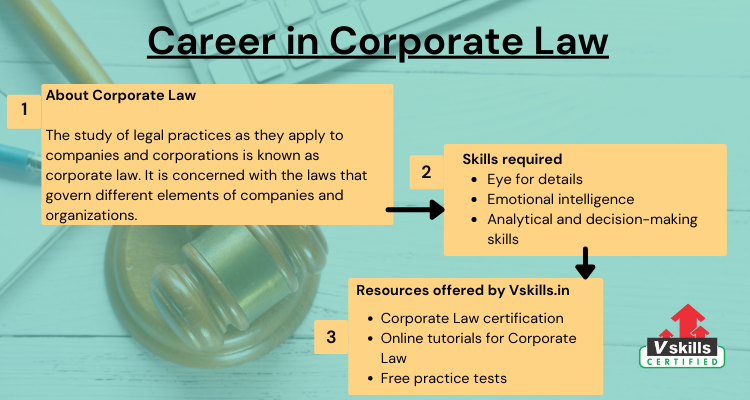The study of legal practices as they apply to companies and corporations is known as corporate law. It is concerned with the laws that govern different elements of companies and organizations.
Let us know about Career in Corporate Law!
About Corporate Lawyer
Candidates’ overall professional responsibilities as corporate attorneys include ensuring and checking the legality of all business transactions for the firm or organization for which they work. Corporate lawyers must also advise their clients on their obligations and legal rights, which includes the responsibilities and duties of the organization’s corporate officials. A corporate lawyer’s function impacts the entire organization, and they represent their companies in legal matters. It is the responsibility of the Corporate Lawyer to handle any company-wide disputes and provide legal remedies.
Roles and Responsibilities
Prepare yourself by taking a look at the overview of the tasks undertaken by a Certified Corporate Law Analyst. Mentioned below are the duties of the qualified practitioners
- To undertake legal research and gather all the legal information that is related to legal matters of the firms
- To undertake deciphering laws, rulings, and regulations in legal documents while also assembling, proofreading and amending drafts of leases, contracts, licenses, policies and other legal documents.
- To keep track and study but also develop written summaries of anticipated and endorsed court decisions, legislation, trade journals, regulations, industry standards and other relevant publications.
- To undertake the primary point of contact for internal business teams that seek legal and regulatory support.
- To function the organization and take care of the matters as per the situation of the firm
Eligibility
If you want to be a consumer advocate, one of the first things you should think about is how much knowledge you’ll need. A bachelor’s degree in law is held by 52.0 percent of consumer advocates, according to our research. In terms of higher education, we discovered that 5.2 percent of consumer advocates had a law master’s degree. Even though most consumer advocates have a college degree, anybody with a high school diploma or GED can become one.
Career Path for Consumer Law
Step 1: Earn a Bachelor’s Degree
Aspiring Corporate advocates may select a major based on their preferred field of study. Advocates who want to fight predatory lending may major in business, accounting, or finance, for example. Civil justice may also be studied by corporate advocates to get experience in areas such as intellectual property and housing safety. Prospective consumer advocates could benefit from a political science major since it will help them grasp policy-making and government procedures.
Step 2: Gain Experience
Internships or volunteer opportunities with consumer advocacy organizations may assist aspiring consumer advocates decide which role they want to play in the advocacy process. Corporate advocate jobs include grassroots organizer, policy analyst, and outreach coordinator, to name a few. Corporate advocates may also conduct product safety testing or serve in administrative roles for charity and government groups.
Step 3: Consider Graduate or Professional Education
Many consumer advocates are simply required to have a bachelor’s degree. A higher degree may be necessary for people pursuing work as legal advocates or seeking employment with the state or federal government. Some attorneys also serve as state corporate advocates; these positions need a Juris Doctor and legal licensing.
Step 4: Get Involved in Consumer Activism to Advance Your Career
Volunteering is a good way for advocates who want to work for a nonprofit organization to start before progressing into paid jobs. Similarly, corporate advocates who want to work for the government at the state or federal level frequently obtain experience working for private groups before applying for government positions. Corporate advocates may work for the government to defend residents against unfair utility prices and practices, or to educate customers about certain important aspects. Being as engaged as possible in your area of advocacy interest is crucial for professional success.
Salary insights and Scope
Law compensates its workers handsomely, as long as they work for a well-known company. Many legal firms even compensate their interns adequately. A corporate lawyer’s compensation rises with his or her years of experience. A corporate lawyer’s compensation rises and falls based on his or her professional success. A corporate lawyer’s compensation is closely related to the business where he or she works, as larger and more well-known companies pay their workers far more than smaller firms. A fresher’s starting pay at a normal tier 1 corporate organization is around Rs. 15 lakh per year. The lowest compensation available to business attorneys may be as low as Rs. 3 lakh per year.
Corporate attorneys are required by virtually all corporations and organizations in almost all industries. Nowadays, every corporation has its own corporate lawyer that represents the firm in legal matters. It is critical for businesses to engage corporate attorneys so that they can handle any potentially contentious situations that may arise. Candidates who are hired as Corporate Lawyers at such firms would be required to give up their license.
Resources offered by Vskills for Career in Consumer Law
Vskills offer Corporate Law certification for all those interested in working in this field or in advancing their career. This certification course covers the following objectives –
- Incorporation Of Company And Matters
- Prospectus And Allotment Of Securities
- Share Capital And Debentures
- Acceptance Of Deposits By Companies
- Registration Of Charges
- Management And Administration
- Declaration And Payment Of Dividend
- Accounts Of Companies, Audit And Auditors
- Appointment And Qualifications Of Directors
- Meetings Of Board And Its Powers
- Appointment And Remuneration Of Managerial Personnel
- Inspection, Inquiry And Investigation
- Compromises, Arrangements And Amalgamations
- Prevention Of Oppression And Mismanagement
- Registered Valuers
- Removal Of Names Of Companies From The Register Of Companies
- Revival And Rehabilitation Of Sick Companies
- Winding Up, Voluntary winding up, and Winding up of unregistered companies
- Provisions applicable to every mode of winding up
- Official liquidators
- Companies authorized to register under this Act
- Companies Incorporated Outside India
- Government Companies
- Registration Offices And Fees
- Companies To Furnish Information Or Statistics
- National Company Law Tribunal, Special Courts
Vskills also offers free practice tests and online tutorials to supplement the learning process. You can check them by clicking on the following links –
Discover the career opportunities and other prospects of Career in Corporate Law. Hurry up and start preparing now with Vskills.in!




